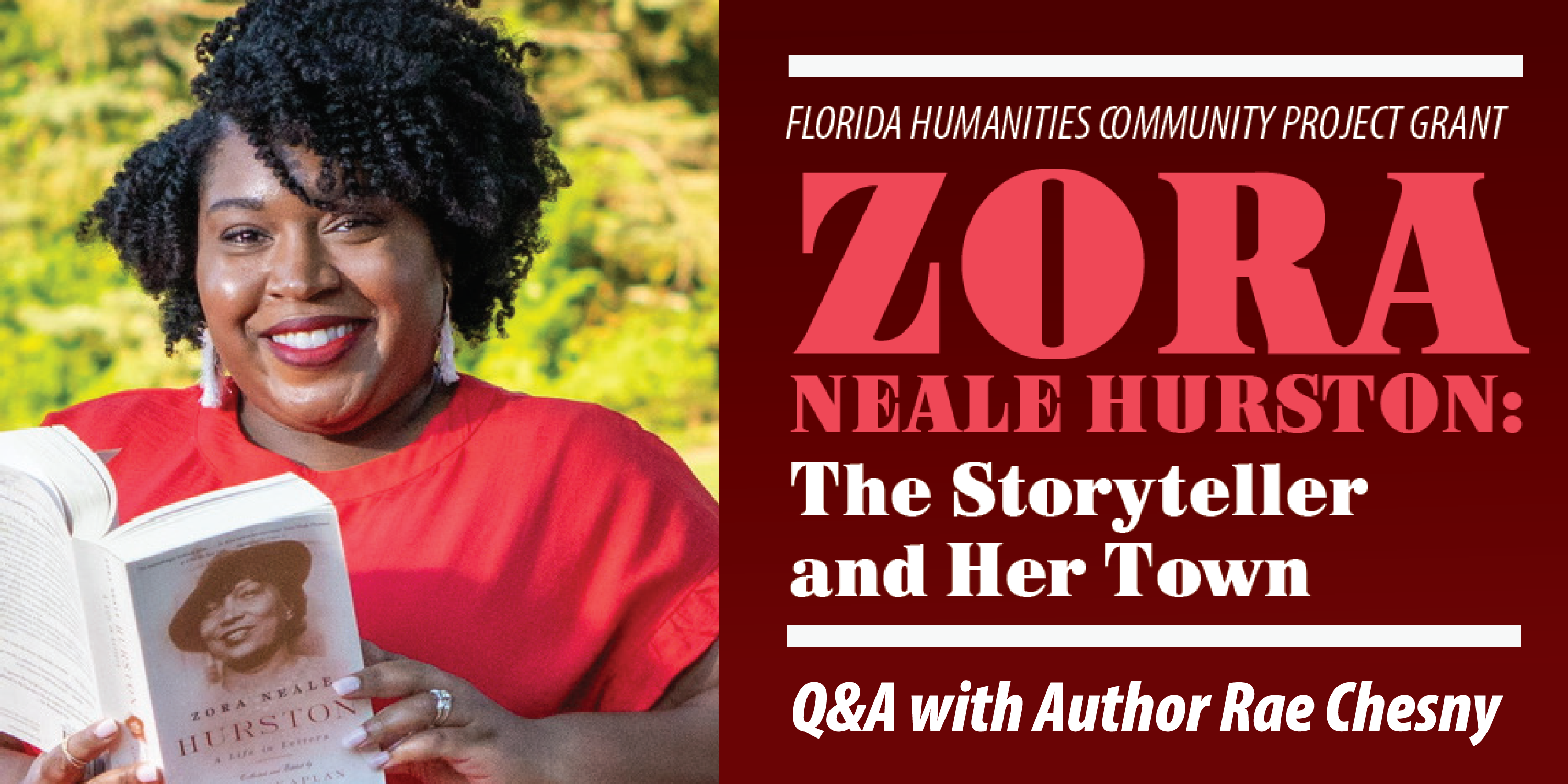Award-winning social expert and author Rae Chesny will be joining us at Eatonville Branch to host a three-day event series called Zora Neale Hurston: The Storyteller and Her Town. Library staff have also partnered with Eatonville Chamber of Commerce and ZORA! Festival as part of the project. This program has been funded by the Community Project Grant from Florida Humanities.
How did you discover Zora Neale Hurston?
I was first introduced to Zora when I was assigned Their Eyes Were Watching God for my 10th grade English class. I didn’t read the book, however. It wasn’t until I was asked to do a Black History presentation for Michigan State University in 2018 that I became enamored with Zora through my research.
What led you to become a Zora Neale Hurston Scholar?
Lots of research and learning. Since my first Black History presentation for Michigan State University presentation in 2018, I have become committed to sharing the legacy of Zora through annual presentations, community talks, and even on social media. I am a student of other Hurston scholars and of Zora’s too.
How has Zora Neale Hurston influenced your life?
Learning about Zora has given me the courage to go after my dreams and stay true to what compels me, while knowing that there are no guarantees in life. From her life, I have learned that there is no perfect moment or condition in which I can begin doing what my heart calls me to do. Since I learned that, life has opened up for me in unimaginable ways.
As an author yourself, does Zora inspire any of your work?
Yes, of course. I have three projects I am working on now that either center on Zora or are inspired by her work.
What is significant about Zora Neale Hurston’s upbringing in Eatonville?
Unlike her other Harlem Renaissance contemporaries, Zora grew up in the first all-black town that was legally incorporated and had its own government. Without a racially charged climate to shape her days, she had a particular privilege and perspective that most Black people weren’t (and still aren’t) afforded. Add to that her father was mayor of Eatonville for three terms and penned many of the town’s laws.
What period is significant to Zora Neale Hurston?
Zora Neale Hurston was a significant player in the Harlem Renaissance (1920s–early 1930s) and throughout the Great Depression. In fact, much of her anthropological work and literary work was done from the mid-1920s to the 1940s.
What makes Zora Neale Hurston different from other Harlem Renaissance contemporaries?
For one, while Zora was not the first Black writer to use dialect in her work, she was the only trained anthropologist who did fieldwork through the South, West Indies, and the Caribbean. Unlike her peers, as an ethnographer, she could record regional dialect by ear and capture it on the page. She also fought against the idea that Black people needed to assimilate into whiteness and refused to use her work to showcase the “Race Problem.”
What is unique about your presentations on Zora Neale Hurston?
I am in no way a traditional scholar, so my work in sharing Zora’s legacy isn’t either. I share the facts, but my goal is to provide every audience member with a window into my deep love for Zora as I make her come alive for them. The goal is to have them leave with their own curiosity about Zora and hopefully ready to do some research of their own.
For those looking to read Zora Neale Hurston’s work, what book do you recommend they read first?
Zora’s most popular book is Their Eyes Were Watching God, and with good reason. For conversational purposes, it is a great place to start. However, to see a more expansive range of Zora’s genius, I recommend her short story collection, Hitting a Straight Lick with a Crooked Stick.
What is your favorite Zora Neale Hurston book or story?
My favorite book by Zora is Jonah’s Gourd Vine. My favorite short story is Drenched in Light.
What Florida sites do you recommend lovers of Zora Neale Hurston to visit?
Zoraphiles (lovers of Zora) must visit her hometown of Eatonville, of course. I recommend a visit to the Zora Neale Hurston Museum of Fine Arts and the Eatonville Public Library. The Dust Tracks Heritage Trail in Fort Pierce is phenomenal, as well.
How and why do you think Zora can still make an impact on people today?
I think Zora’s life is rich with moments to learn from and be inspired by. I think she gives us a powerful lesson in persistence and being commitment to what we feel compelled to do, even when others don’t necessarily understand it.
What is something you wish everyone knew about Zora Neale Hurston?
I wish everyone knew how much Zora loved her people and the amount of sacrifice she made to help us love ourselves. Although Zora was undoubtedly a prolific writer, she deserves so much more credit for her cultural contributions through her anthropological work.
What do you have planned next for your career?
I have learned not to plan too much. If someone could have told me that I would be presenting on Zora at the annual festival in her honor or doing the level of research that I do, I would have laughed. However, I do fully intend to keep researching and sharing Zora’s legacy in whatever ways opportunities present themselves.
Do you have any publications related to Zora Neale Hurston?
I am working on a few, but I can share that my poem When Zora Rises was selected for the Zora’s Den The Fire Inside Vol. 2 Anthology. I also have a book releasing in January 2022 called Dear Zora, which is a collection of letters I began writing to Zora back in 2018.

